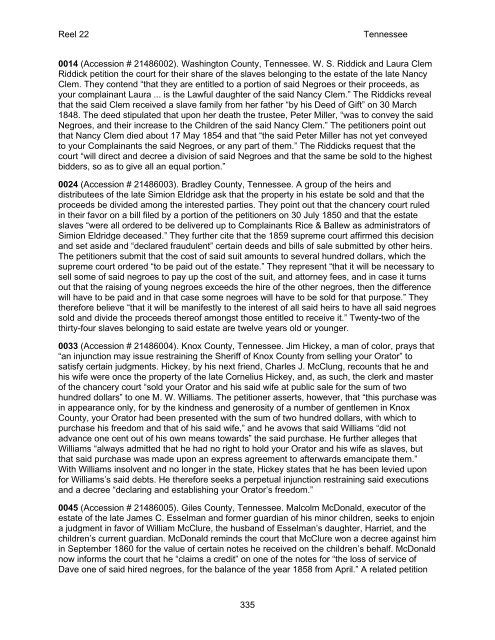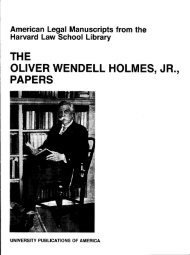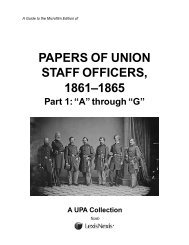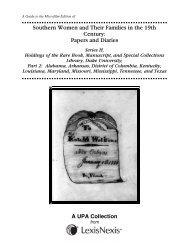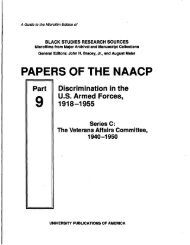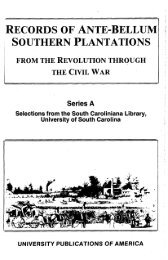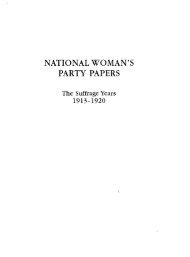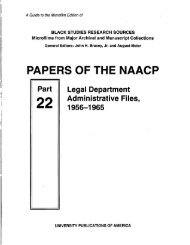- Page 1 and 2:
A Guide to the Microfilm Edition of
- Page 3 and 4:
BLACK STUDIES RESEARCH SOURCES Micr
- Page 5 and 6:
TABLE OF CONTENTS Introduction ....
- Page 7 and 8:
Reel 8 Missouri cont. 1849 ........
- Page 9 and 10:
Reel 21 Tennessee cont. 1858 ......
- Page 11 and 12:
INTRODUCTION The Race and Slavery P
- Page 13 and 14:
the state. Most of the cases began
- Page 15 and 16:
John Berry Meachum, a well-known fr
- Page 17 and 18:
SCOPE AND CONTENT NOTE Series II of
- Page 19 and 20:
Amended and revivor petitions, dock
- Page 21:
TENNESSEE number of subject petitio
- Page 25 and 26:
ACKNOWLEDGMENTS It is a pleasure to
- Page 27 and 28:
REEL INDEX The following index is a
- Page 29 and 30:
Reel 1 Arkansas 0269 (Accession # 2
- Page 31 and 32:
Reel 1 Arkansas 0742 (Accession # 2
- Page 33 and 34:
Reel 2 Arkansas has been offered
- Page 35 and 36:
Reel 2 Arkansas sale by one I. B. P
- Page 37 and 38:
Reel 2 Arkansas 0740 (Accession # 2
- Page 39 and 40:
Reel 3 Arkansas 0013 (Accession # 2
- Page 41 and 42:
Reel 3 Arkansas he has been offered
- Page 43 and 44:
Reel 3 Arkansas disease called ‘p
- Page 45 and 46:
Reel 3 Arkansas heirs at law, seeks
- Page 47 and 48:
Reel 3 Missouri Citing the Northwes
- Page 49 and 50:
Reel 3 Missouri 0661 (Accession # 2
- Page 51 and 52:
Reel 3 Missouri “for the recovery
- Page 53 and 54:
Reel 4 Missouri 0062 (Accession # 2
- Page 55 and 56:
Reel 4 Missouri habeas corpus “to
- Page 57 and 58:
Reel 4 Missouri prays that “he ma
- Page 59 and 60:
Reel 4 Missouri of Illinois” in 1
- Page 61 and 62:
Reel 4 Missouri recounts that Alcor
- Page 63 and 64:
Reel 4 Missouri freedom,” the pet
- Page 65 and 66:
Reel 4 Missouri transported them to
- Page 67 and 68:
Reel 5 Missouri five years ago and
- Page 69 and 70:
Reel 5 Missouri of Isham Harrison.
- Page 71 and 72:
Reel 5 Missouri slavery.” Claimin
- Page 73 and 74:
Reel 5 Missouri 0663 (Accession # 2
- Page 75 and 76:
Reel 5 Missouri wit by frequently &
- Page 77 and 78:
Reel 6 Missouri court that her owne
- Page 79 and 80:
Reel 6 Missouri Paulding, and Lacke
- Page 81 and 82:
Reel 6 Missouri permitted to sue as
- Page 83 and 84:
Reel 6 Missouri second phase of the
- Page 85 and 86:
Reel 7 Missouri further notes that
- Page 87 and 88:
Reel 7 Missouri George W. Coons, th
- Page 89 and 90:
Reel 7 Missouri next friend so that
- Page 91 and 92:
Reel 7 Missouri 0576 (Accession # 2
- Page 93 and 94:
Reel 7 Missouri brought her to St.
- Page 95 and 96:
Reel 7 Missouri avers that slavery
- Page 97 and 98:
Reel 8 Missouri 0074 (Accession # 2
- Page 99 and 100:
Reel 8 Missouri negroes in perpetua
- Page 101 and 102:
Reel 8 Missouri feet.” He asks th
- Page 103 and 104:
Reel 8 Missouri instrument by which
- Page 105 and 106:
Reel 9 Missouri Reel 9 Missouri con
- Page 107 and 108:
Reel 9 Missouri 1854 0196 (Accessio
- Page 109 and 110:
Reel 9 Missouri 1856 0421 (Accessio
- Page 111 and 112:
Reel 9 Missouri individually for th
- Page 113 and 114:
Reel 10 Tennessee extent and not of
- Page 115 and 116:
Reel 10 Tennessee purchased a negro
- Page 117 and 118:
Reel 10 Tennessee 0191 (Accession #
- Page 119 and 120:
Reel 10 Tennessee to the said Ander
- Page 121 and 122:
Reel 10 Tennessee and pay him the h
- Page 123 and 124:
Reel 10 Tennessee 0573 (Accession #
- Page 125 and 126:
Reel 10 Tennessee 1826 0695 (Access
- Page 127 and 128:
Reel 10 Tennessee home and “then
- Page 129 and 130:
Reel 10 Tennessee 0873 (Accession #
- Page 131 and 132:
Reel 11 Tennessee 0020 (Accession #
- Page 133 and 134:
Reel 11 Tennessee Defendant had by
- Page 135 and 136:
Reel 11 Tennessee suppose by mistak
- Page 137 and 138:
Reel 11 Tennessee said Martin Clark
- Page 139 and 140:
Reel 11 Tennessee 0515 (Accession #
- Page 141 and 142:
Reel 11 Tennessee property if any a
- Page 143 and 144:
Reel 11 Tennessee dower right. She
- Page 145 and 146:
Reel 11 Tennessee 0782 (Accession #
- Page 147 and 148:
Reel 11 Tennessee 0875 (Accession #
- Page 149 and 150:
Reel 12 Tennessee know not.” Havi
- Page 151 and 152:
Reel 12 Tennessee “acknowledged a
- Page 153 and 154:
Reel 12 Tennessee his possession si
- Page 155 and 156:
Reel 12 Tennessee interest ... due
- Page 157 and 158:
Reel 12 Tennessee 1838 0446 (Access
- Page 159 and 160:
Reel 12 Tennessee receive “a chil
- Page 161 and 162:
Reel 12 Tennessee and to “pay ove
- Page 163 and 164:
Reel 12 Tennessee 0749 (Accession #
- Page 165 and 166:
Reel 12 Tennessee 0898 (Accession #
- Page 167 and 168:
Reel 12 Tennessee 1837 will, howeve
- Page 169 and 170:
Reel 13 Tennessee Dorinda Parker. B
- Page 171 and 172:
Reel 13 Tennessee pay the estate’
- Page 173 and 174:
Reel 13 Tennessee Tennessee” at t
- Page 175 and 176:
Reel 13 Tennessee and Brevard now
- Page 177 and 178:
Reel 13 Tennessee and three-year-ol
- Page 179 and 180:
Reel 13 Tennessee said Negro out of
- Page 181 and 182:
Reel 13 Tennessee charges” is “
- Page 183 and 184:
Reel 13 Tennessee between your orat
- Page 185 and 186:
Reel 13 Tennessee 0704 (Accession #
- Page 187 and 188:
Reel 13 Tennessee free.” Mahan’
- Page 189 and 190:
Reel 13 Tennessee state of Tennesse
- Page 191 and 192:
Reel 13 Tennessee said Betsy.” Ac
- Page 193 and 194:
Reel 14 Tennessee the slaves “and
- Page 195 and 196:
Reel 14 Tennessee to Virginia “wi
- Page 197 and 198:
Reel 14 Tennessee property” remai
- Page 199 and 200:
Reel 14 Tennessee of being discount
- Page 201 and 202:
Reel 14 Tennessee their share of Fr
- Page 203 and 204:
Reel 14 Tennessee same.” He speci
- Page 205 and 206:
Reel 14 Tennessee respective shares
- Page 207 and 208:
Reel 14 Tennessee more children, se
- Page 209 and 210:
Reel 14 Tennessee account of his gu
- Page 211 and 212:
Reel 14 Tennessee defendants sold t
- Page 213 and 214:
Reel 15 Tennessee ... to become ...
- Page 215 and 216:
Reel 15 Tennessee she generated wer
- Page 217 and 218:
Reel 15 Tennessee departure, he sol
- Page 219 and 220:
Reel 15 Tennessee education and sup
- Page 221 and 222:
Reel 15 Tennessee $650.00.” He se
- Page 223 and 224:
Reel 15 Tennessee 0506 (Accession #
- Page 225 and 226:
Reel 15 Tennessee County,” with w
- Page 227 and 228:
Reel 15 Tennessee 0682 (Accession #
- Page 229 and 230:
Reel 15 Tennessee town lot” in Th
- Page 231 and 232:
Reel 16 Tennessee Benjamin Johnson,
- Page 233 and 234:
Reel 16 Tennessee 0113 (Accession #
- Page 235 and 236:
Reel 16 Tennessee to the interest o
- Page 237 and 238:
Reel 16 Tennessee Henry Driver beca
- Page 239 and 240:
Reel 16 Tennessee One of the origin
- Page 241 and 242:
Reel 16 Tennessee honest slave and
- Page 243 and 244:
Reel 16 Tennessee 0561 (Accession #
- Page 245 and 246:
Reel 16 Tennessee brought to the ma
- Page 247 and 248:
Reel 16 Tennessee of this court.”
- Page 249 and 250:
Reel 17 Tennessee Fanny’s childre
- Page 251 and 252:
Reel 17 Tennessee 0127 (Accession #
- Page 253 and 254:
Reel 17 Tennessee of adultery.” M
- Page 255 and 256:
Reel 17 Tennessee portion of their
- Page 257 and 258:
Reel 17 Tennessee 0374 (Accession #
- Page 259 and 260:
Reel 17 Tennessee their shares of t
- Page 261 and 262:
Reel 17 Tennessee only eligible to
- Page 263 and 264:
Reel 17 Tennessee family owns a tra
- Page 265 and 266:
Reel 17 Tennessee 0767 (Accession #
- Page 267 and 268:
Reel 17 Tennessee remain in Davidso
- Page 269 and 270:
Reel 18 Tennessee were owned by Wil
- Page 271 and 272:
Reel 18 Tennessee Newmans argue tha
- Page 273 and 274:
Reel 18 Tennessee “left in the ha
- Page 275 and 276:
Reel 18 Tennessee “missed said pa
- Page 277 and 278:
Reel 18 Tennessee 0436 (Accession #
- Page 279 and 280:
Reel 18 Tennessee of land allotted
- Page 281 and 282:
Reel 18 Tennessee 0666 (Accession #
- Page 283 and 284:
Reel 18 Tennessee that said conveya
- Page 285 and 286:
Reel 18 Tennessee County, North Car
- Page 287 and 288:
Reel 18 Tennessee that, “less tha
- Page 289 and 290:
Reel 18 Tennessee 0979 (Accession #
- Page 291 and 292:
Reel 18 Tennessee 1129 (Accession #
- Page 293 and 294:
Reel 19 Tennessee slaves, Washingto
- Page 295 and 296:
Reel 19 Tennessee slaves to him on
- Page 297 and 298:
Reel 19 Tennessee the trust deed. T
- Page 299 and 300:
Reel 19 Tennessee Barnes maintains
- Page 301 and 302:
Reel 19 Tennessee She owns “in ri
- Page 303 and 304:
Reel 19 Tennessee funds owed the tr
- Page 305 and 306:
Reel 19 Tennessee the alimony, Litt
- Page 307 and 308:
Reel 19 Tennessee pointed a knife a
- Page 309 and 310: Reel 19 Tennessee note that was lat
- Page 311 and 312: Reel 19 Tennessee enjoined from int
- Page 313 and 314: Reel 19 Tennessee sham sales” in
- Page 315 and 316: Reel 19 Tennessee to carry on the b
- Page 317 and 318: Reel 20 Tennessee court and ask tha
- Page 319 and 320: Reel 20 Tennessee 0143 (Accession #
- Page 321 and 322: Reel 20 Tennessee and a slave for l
- Page 323 and 324: Reel 20 Tennessee settled “not on
- Page 325 and 326: Reel 20 Tennessee the will and desi
- Page 327 and 328: Reel 20 Tennessee “run or remove
- Page 329 and 330: Reel 20 Tennessee 0768 (Accession #
- Page 331 and 332: Reel 20 Tennessee that he never rec
- Page 333 and 334: Reel 20 Tennessee Evans’s 1844 wi
- Page 335 and 336: Reel 20 Tennessee the Krotzer famil
- Page 337 and 338: Reel 21 Tennessee the value of said
- Page 339 and 340: Reel 21 Tennessee slaves. The petit
- Page 341 and 342: Reel 21 Tennessee levied on a town
- Page 343 and 344: Reel 21 Tennessee removing, or disp
- Page 345 and 346: Reel 21 Tennessee additional money
- Page 347 and 348: Reel 21 Tennessee considerations pa
- Page 349 and 350: Reel 21 Tennessee Judgments against
- Page 351 and 352: Reel 21 Tennessee testator.” Wall
- Page 353 and 354: Reel 21 Tennessee person, he merely
- Page 355 and 356: Reel 21 Tennessee directed that his
- Page 357 and 358: Reel 21 Tennessee share or interest
- Page 359: Reel 21 Tennessee necessary to pay
- Page 363 and 364: Reel 22 Tennessee that “the debt
- Page 365 and 366: Reel 22 Tennessee F Simpson.” The
- Page 367 and 368: Reel 22 Tennessee six-year-old slav
- Page 369 and 370: Reel 22 Tennessee 0303 (Accession #
- Page 371 and 372: Reel 22 Tennessee recovered against
- Page 373 and 374: Reel 22 Tennessee his will.” The
- Page 375 and 376: Reel 22 Tennessee master’s will.
- Page 377 and 378: Reel 23 Texas Reel 23 Texas 1832 00
- Page 379 and 380: Reel 23 Texas of your petitioner, &
- Page 381 and 382: Reel 23 Texas 1839. The petitioner
- Page 383 and 384: Reel 23 Texas Susanna counters that
- Page 385 and 386: Reel 23 Texas 0597 (Accession # 215
- Page 387 and 388: Reel 23 Texas great value ‘to wit
- Page 389 and 390: Reel 23 Texas your petitioner in sa
- Page 391 and 392: Reel 23 Texas 0981 (Accession # 215
- Page 393 and 394: Reel 24 Texas who are seventy-four
- Page 395 and 396: Reel 24 Texas of the City” and wa
- Page 397 and 398: Reel 24 Texas 0286 (Accession # 215
- Page 399 and 400: Reel 24 Texas 0405 (Accession # 215
- Page 401 and 402: Reel 24 Texas the purpose of “pro
- Page 403 and 404: Reel 24 Texas 0694 (Accession # 215
- Page 405 and 406: Reel 24 Texas petitions that the se
- Page 407 and 408: Reel 25 Texas Benjamin Hawkins. Aft
- Page 409 and 410: Reel 25 Texas that Cain sold a pian
- Page 411 and 412:
Reel 25 Texas Benjamin to have had
- Page 413 and 414:
Reel 25 Texas 0632 (Accession # 215
- Page 415 and 416:
Reel 25 Texas sustained at $1,000.
- Page 417 and 418:
Reel 26 Texas Noland Luckett’s es
- Page 419 and 420:
Reel 26 Texas 1858 0166 (Accession
- Page 421 and 422:
Reel 26 Texas 0308 (Accession # 215
- Page 423 and 424:
Reel 26 Texas 0437 (Accession # 215
- Page 425 and 426:
Reel 26 Texas 0532 (Accession # 215
- Page 427 and 428:
Reel 26 Texas 0676 (Accession # 215
- Page 429 and 430:
Reel 26 Texas 0762 (Accession # 215
- Page 431 and 432:
NAME INDEX The following index is a
- Page 433 and 434:
Allen, Robert 16: 0358 Allen, Samue
- Page 435 and 436:
Armstrong, George 25: 0248 Armstron
- Page 437 and 438:
Barlow, William H. 17: 0273 Barnard
- Page 439 and 440:
Bennet, D. John 11: 0253 Bennett, A
- Page 441 and 442:
Bogart, Solomon 13: 0356 Bogee, Mr.
- Page 443 and 444:
Braden, Thomas M. 19: 0272 Braden,
- Page 445 and 446:
Brown, Ann McCallum 22: 0489 Brown,
- Page 447 and 448:
Burleson, John 25: 0710 Burnet, Nan
- Page 449 and 450:
Campbell, James D. 15: 0087 Campbel
- Page 451 and 452:
Caruthers, Elizabeth McCallum Huff
- Page 453 and 454:
Chaves, Candice 17: 0280 Chaves, Fr
- Page 455 and 456:
Clem, John 22: 0014 Clem, Samuel 22
- Page 457 and 458:
Corley, Ritchard 17: 0615 Corn, Ben
- Page 459 and 460:
Crowder, Green 4: 0538 Crowson, Tho
- Page 461 and 462:
Davis, James C. 15: 0698 Davis, Jam
- Page 463 and 464:
Dobbins, Hannah 12: 0156 Dobbins, H
- Page 465 and 466:
Durrett, William H. 24: 0248 Durst,
- Page 467 and 468:
England, Adam 19: 0875 England, Eli
- Page 469 and 470:
Figures, Harriet S. 12: 0688 Figure
- Page 471 and 472:
Fulghum, Hester A. 26: 0367 Fulghum
- Page 473 and 474:
Gillett, Philo 9: 0137 Gilliam, Har
- Page 475 and 476:
Gray, Henry 12: 0312 Gray, Henry 17
- Page 477 and 478:
Hall, Martha 23: 0503 Hall, Mary Sn
- Page 479 and 480:
Harris, Martha 18: 0544 Harris, Mar
- Page 481 and 482:
Hendricks, Elisha 17: 0243 Hendrick
- Page 483 and 484:
Holden, William B. 13: 0117 Holland
- Page 485 and 486:
Howard, Mary Ann 20: 0068 Howard, M
- Page 487 and 488:
Isaac 22: 0513 Isaac Henry 2: 0740
- Page 489 and 490:
Johnson, Anthony W. 19: 0221 Johnso
- Page 491 and 492:
Jorden, James B. 17: 0268 Jorden, J
- Page 493 and 494:
Kirkpatrick, Elizabeth 3: 0002 Kirk
- Page 495 and 496:
Lee, Descinda 10: 0063 Lee, Elizabe
- Page 497 and 498:
Love, Thomas W. 21: 0140 Lowe, Easo
- Page 499 and 500:
Marianne 4: 0757 Marie 3: 0566 Mari
- Page 501 and 502:
Maxwell, David 22: 0111 Maxwell, Da
- Page 503 and 504:
McFarland, M. N. 20: 0230 McGahey,
- Page 505 and 506:
McRady, Ephraim W. 14: 0395 McRay,
- Page 507 and 508:
Mitt, Mary Cate 13: 0641 Mix, E. 20
- Page 509 and 510:
Moulton, Jonathan B. 7: 0560 Moulto
- Page 511 and 512:
Newman, Albert G. 9: 0593 Newman, A
- Page 513 and 514:
Overton, Thomas 21: 0349 Owen, Dani
- Page 515 and 516:
Payne, John 12: 1026 Payne, Joseph
- Page 517 and 518:
Pheobus, Leonard 17: 0035 Philibert
- Page 519 and 520:
President and directors of the Bank
- Page 521 and 522:
Record, James C. 15: 0282 Rector, W
- Page 523 and 524:
Riley, William R. 8: 0720 Rives, An
- Page 525 and 526:
Rowland, Sally 12: 1026 Rowland, Te
- Page 527 and 528:
Saunders, Nancy 9: 0405 Saunders, P
- Page 529 and 530:
Shelton, Joseph S. 17: 0622 Shelton
- Page 531 and 532:
Smith, Granville P. 17: 0333 Smith,
- Page 533 and 534:
Splane, Peyton R. 23: 0149 Spriggs,
- Page 535 and 536:
Susette 4: 0253 Suter, James 17: 02
- Page 537 and 538:
Thomas, William 24: 0427 Thomas, Wi
- Page 539 and 540:
Tony, Elijah 19: 0360 Torrence, Ann
- Page 541 and 542:
Vaden, Woodson 20: 0151 Vaden, Zill
- Page 543 and 544:
Walsh, Thomas 18: 1094 Walthall, An
- Page 545 and 546:
Westbrook, Dr. J. B. 21: 0674 Westb
- Page 547 and 548:
Williams, Elizabeth 8: 0428 William
- Page 549 and 550:
Woodfolk, William 10: 0210 Woodfolk
- Page 551 and 552:
GEOGRAPHIC INDEX The following inde
- Page 553 and 554:
18: 0093, 0184, 0800, 0817, 0920; 1
- Page 555 and 556:
Rhea County, Tenn. 10: 0130; 14: 05
- Page 557:
0715, 0732; 14: 0026, 0038, 0051, 0
- Page 560 and 561:
Black genealogy Missouri 3: 0840, 0
- Page 562 and 563:
Disease cont. Tennessee 13: 0750; 1
- Page 564 and 565:
Families, suits within cont. Tennes
- Page 566 and 567:
Free persons of color held as slave
- Page 568 and 569:
Insubordination Tennessee 18: 0747;
- Page 570 and 571:
Purchase of slaves Missouri 5: 0674
- Page 572 and 573:
Slave management cont. Texas 24: 04
- Page 574 and 575:
Slaves mortgaged cont. Tennessee co
- Page 576 and 577:
Violence cont. Tennessee 10: 0775 T
- Page 579:
RELATED UPA COLLECTIONS RACE, SLAVE


